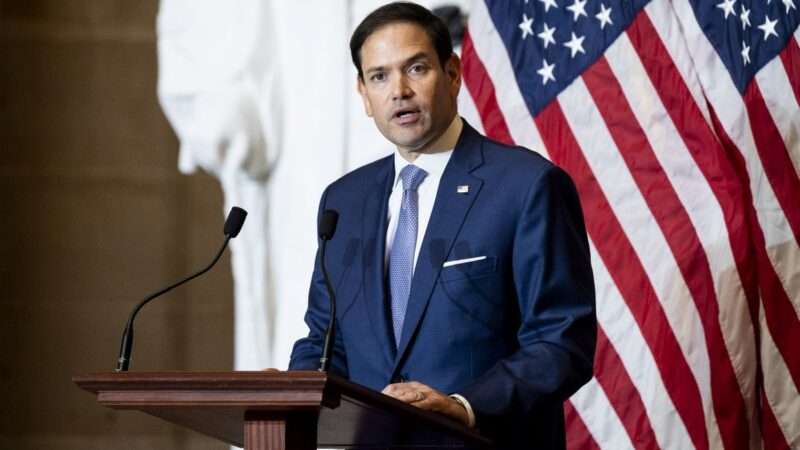
Florida Republican Sen. Marco Rubio is saying he won't vote for a new bill that would repeal the Defense of Marriage Act (DOMA), the 1996 law that banned federal recognition of gay marriage. But his explanation suggests Rubio doesn't truly understand either DOMA or the new bill.
The Respect for Marriage Act, which passed the House last night, would strike down DOMA and require states to recognize same-sex marriages that have been performed legally in other states.
Under current law, thanks to two Supreme Court decisions, same-sex marriages are legally recognized all across the country, and DOMA is not being enforced, nor are any state-level bans that are still on the books. But the overturning of Roe v. Wade has led to concerns that other Supreme Court precedents may be at stake. The Respect for Marriage Act is intended to preemptively respond to a potential future Supreme Court ruling overturning the judicial precedents that legalized same-sex marriage nationally. If the Respect for Marriage Act were to pass, DOMA would no longer exist and the federal government would still recognize same-sex marriages performed in states that allow it.
The Respect for Marriage Act passed the House with support of all Democrats and 47 Republicans (including six Republicans from Florida). Now all eyes are on the Senate to see if 10 Republicans will support the bill and thereby make it immune to a filibuster.
Over at Business Insider, Rubio says he's a "no" vote because marriage is a state issue, which would be a defensible position if it weren't for the fact that DOMA—the law he wants to uphold on states rights grounds—makes marriage a federal issue.
"States decide marriage laws, they always have," Rubio said, according to Business Insider. "It's why you can get married in Las Vegas by an Elvis impersonator in two hours." He insisted to Business Insider that the bill was a "waste of our time on a non-issue."
This characterization of marriage would be lovely and wonderful if it were true. What he is either ignoring or not understanding is that DOMA deliberately stepped in and stopped the federal government from recognizing these marriages, and it affected everything from employee benefits and taxes, to adoption regulations and immigration. The states may be the ones setting the guidelines for marriage but federal recognition is not an afterthought. Whether the federal government recognizes a couple's marriage affects their lives significantly.
Rubio is correct that you can currently go to Las Vegas and get married by an Elvis impersonator. And, assuming you followed Nevada's laws, you can also come home and expect that your marriage will be recognized by your home state. But under DOMA, states that refuse to allow same-sex marriages could ignore the legal protections inherent in marriages performed in states where it is legal. That may be a "non-issue" for heterosexual couples, but it's a pretty big deal for the roughly 980,000 same-sex households in the U.S.
The irony here is that the Respect for Marriage Act would create the state-level system that Rubio appears to think is provided by DOMA. The Respect for Marriage Act does not require or force any state to marry same-sex couples. It does require them to recognize same-sex marriages legally performed in other states.
So in the event that the Supreme Court gay marriage precedents get struck down, Florida's statute banning clerks from giving marriage licenses to same-sex couples would be restored. Under the Respect for Marriage Act, Florida would, however, be required to recognize same-sex marriages from Massachusetts (which legalized recognition prior to the Supreme Court's ruling and wouldn't be affected by its reversal).
If Rubio actually did want control over marriages to remain at the state level, then honestly he should be jumping at the chance to get rid of DOMA.
The post Marco Rubio Says He Won't Vote To Eliminate the Defense of Marriage Act, But His Explanation Makes No Sense appeared first on Reason.com.







